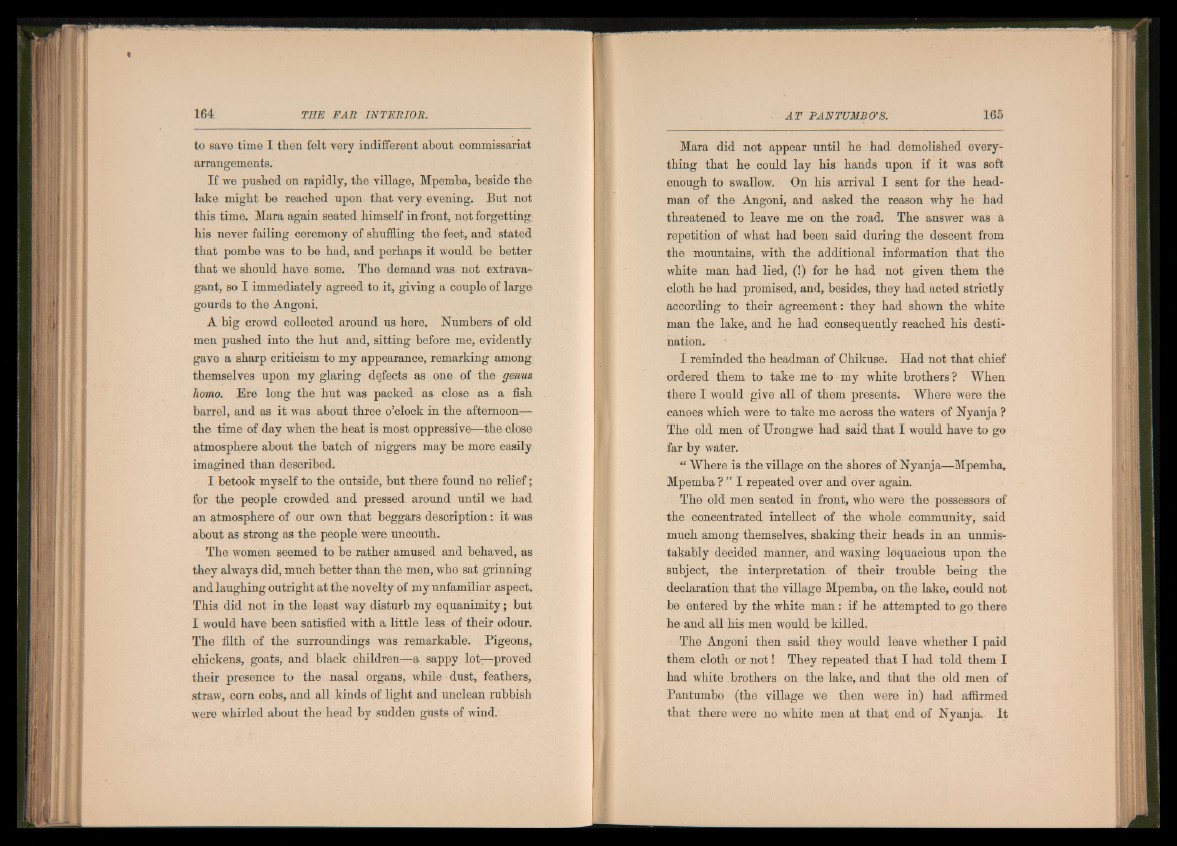
to save time I then felt very indifferent about comnfissariat
arrangements.
If we pushed on rapidly, the village, Mpemba, beside the
lake might be reached upon that very evening. But not
this time. Mara again seated himself in front, not forgetting
his never failing ceremony of shuffling the feet, and stated
that pombe was to be had, and perhaps it would be better
that we should have some. The demand was not extravagant,
so I immediately agreed to it, giving a couple of large
gourds to the Angoni.
A big crowd collected around us here. Numbers of old
men pushed into the hut and, sitting before me, evidently
gave a sharp criticism to my appearance, remarking among
themselves upon my glaring defects as one of the genus
homo. Ere long the hut was packed as close as a fish
barrel, and as it was about three o’clock in the afternoon—
the time of day when the heat is most oppressive—the close
atmosphere about the batch of niggers may be more easily
imagined than described.
I betook myself to the outside, but there found no relief;
for the people crowded and pressed around until we had
an atmosphere of our own that beggars description: it was
about as strong as the people were uncouth.
The women seemed to be rather amused and behaved, as
they always did, much better than the men, who sat grinning
and laughing outright at the novelty of my unfamiliar aspect.
This did not in the least way disturb my equanimity ; but
I would have been satisfied with a little less of their odour.
The filth of the surroundings was remarkable. Pigeons,
chickens, goats, and black children—a sappy lot:—proved
their presence to the nasal organs, while dust, feathers,
straw, com cobs, and all kinds of light and unclean rubbish
were whirled about the head by sudden gusts of wind.
Mara did not appear until he had demolished everything
that he could lay his hands upon if it was soft
enough to swallow. On his arrival I sent for the headman
of the Angoni, and asked the reason why he had
threatened to leave me on the road. The answer was a
repetition of what had been said during the descent from
the mountains, with the additional information that the
white man had lied, (!) for he had not given them the
cloth he had promised, and, besides, they had acted strictly
according to their agreement : they had shown the white
man the lake, and he had consequently reached his destination.
I reminded the headman of Chikuse. Had not that chief
ordered them to take me to my white brothers ? When
there I would give all of them presents. Where were the
canoes which were to take me across the waters of Nyanja ?
The old men of Urongwe had said that I would have to go
far by water.
“ Where is the village on the shores of Nyanja—Mpemba,
Mpemba ? ” I repeated over and over again.
The old men seated in front, who were the possessors of
the concentrated intellect of the whole community, said
much among themselves, shaking their heads in an unmistakably
decided manner, and waxing loquacious upon the
subject, the interpretation of their trouble being the
declaration that the village Mpemba, on the lake, could not
be entered by the white man : if he attempted to go there
he and all his men would be killed.
The Angoni then said they would leave whether I paid
them cloth or not ! They repeated that I had told them I
had white brothers on the lake, and that the old men of
Pantumbo (the village we then were in) had affirmed
that there were no white men at that end of Nyanja. I t